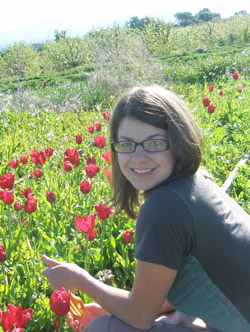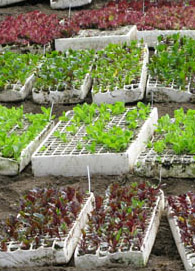Learn Long and Prosper: CUESA's Seller Scholarship Program
April 30, 2010
By Jessica Goldman
 Jolie Devoto describes herself as “a farmer’s market baby.” The daughter of Devoto Gardens’ Stan and Susan Devoto, she remembers playing in her family’s apple boxes since the time she could walk, and as the one in the family who is interested in taking over the business, Jolie feels the farm’s legacy resting firmly on her shoulders.
Jolie Devoto describes herself as “a farmer’s market baby.” The daughter of Devoto Gardens’ Stan and Susan Devoto, she remembers playing in her family’s apple boxes since the time she could walk, and as the one in the family who is interested in taking over the business, Jolie feels the farm’s legacy resting firmly on her shoulders.
“Our farm is at a pivotal moment,” she explains. “We are just about to be certified organic — after a long pursuit — and I am interested in helping my parents further transition their business.”
A current student in the Recreation, Parks, and Tourism Administration program at California Polytechnic State University, Jolie hopes to make Devoto Gardens an agritourism destination. She also understands that, in adding a more commercial facet to their operations, it’s important to preserve the small farm techniques and traditions.
When Jolie heard that this year’s California Small Farm Conference included an agritourism course, she knew she wanted to attend, so she applied for — and received — a scholarship through CUESA.
A little-known initiative, CUESA’s scholarship program was designed to support farmers market sellers in their pursuit of advanced training. It began in 2006 with a $1,000 starter gift from the CCOF Foundation, and it’s based on the recognition that, even for the most experienced farmer, learning is a continual process. Every year since, CUESA has paid for two or more market sellers to attend conferences and educational programs. The fund will be expanded even further this year, thanks to over $4000 raised by Tacolicious through their special guest chef taco series at the Thursday Market.
The Small Farm Conference framed Jolie’s academic passion in a real life context. “I met wonderful people who are already trying to sustain their farm’s bounty through agritourism,” she reports. She learned about navigating county regulations and permits and networked with other farmers she can turn to for advice if she needs it.
How are the scholarship recipients selected? It has everything to do with CUESA’s Sustainability Frameworks for farms and market vendors, two sets of guiding principles. According to the frameworks, sustainable businesses are: ecologically sound, socially just, humane, and economically viable.
“We see sustainability as a continuum,” CUESA’s Director of Education, Julie Cummins, says. “Each business in our market is in a different place, and we want to encourage them to make improvements in any of the four areas.”
In addition to Jolie, CUESA also offered funding to Sarajane Snyder, who recently began her tenure as Farm Manager for Green Gulch Farm. Like Jolie, Sarajane found herself newly responsible for the progression and longevity of an established farm.
 Sarajane worked as an apprentice on the Green Gulch Farm from 2005- 2007. Last fall, she returned to the farm to train the next generation of students. But before she could inspire others, Sarajane wanted to be inspired herself, so she applied for a scholarship to attend the annual Ecological Farming Conference (EcoFarm).
Sarajane worked as an apprentice on the Green Gulch Farm from 2005- 2007. Last fall, she returned to the farm to train the next generation of students. But before she could inspire others, Sarajane wanted to be inspired herself, so she applied for a scholarship to attend the annual Ecological Farming Conference (EcoFarm).
“I am not from California originally,” says Sarajane, “and I wanted to feel more rooted in the culture being grown here.” Sarajane joined thousands of other farmers and farm enthusiasts at EcoFarm, which she describes as the pinnacle of all farming gatherings.
The cultural energy alone was worth the trip. “There were people who had been farming since the 1960’s there beside 18- and 19-year-old college kids, eager to get started. It was really empowering.” But what really struck her was how freely people shared their knowledge. One of the speakers was superstar farmer Eliot Coleman of Four Season Farm. “He has done so many trials to perfect his extended-season growing methods,” Sarajane says, “and he was just giving it all away.”
As her class of new apprentices arrives, Sarajane plans to pass on a general appreciation for farming. “I want to encourage them to seek out the resources available to young farmers and to tap into the network of support that’s at the heart of farming small and local.”
In addition to scholarships, CUESA envisions a future where the organization can offer micro grants to sellers for sustainability projects, like installing a hedgerow or setting up a worker health program. In the meantime, both CUESA and past recipients alike want more sellers to take advantage of this opportunity. “There is money there to go learn about farming,” says Sarajane. “I’m so grateful this program exists.”
Jessica Goldman blogs at Sodium Girl.
